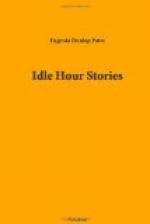“My little woman does not ride, or read, any more,” he said one evening, in the indulgent tone he used towards her.
“Why, yes, I do read. Don’t you see my little library there?”
“Yes, but it seems to me I miss something.”
He missed the litter of trashy novels he had been wont to see.
“I told you I was learning to walk;” she added, with a smile, “I really do walk somewhere every day.”
“That pleases me most of all,” he said in his cheery way, “but what will Dr. Bull think. You know he prescribes rest and quiet.”
“I don’t care one bit; I have long since cut his acquaintance.”
* * * * *
The end of the year rolled round. Eleanor watched her husband’s face with ever increasing anxiety. One evening he sat buried in thought from which all her endeavors could not rouse him. He did not feel well, he said. All night he tossed and muttered. Calculations and figures were uppermost.
He was up early, as usual, and away. Eleanor hastened her preparations, and carefully counted her little hoard—the earnings of months. Early in the afternoon she came home with the proceeds of her last batch of type-writing, glowing with exercise, and the happiness of contributing at least some hundreds to meet her husband’s creditors. He was there, lying on the sofa, pale and hopeless. Forgetting all else, she flung herself beside him with a sob.
“Oh! Harry, my dearest! Tell me what it is that is killing you—I have a right to know.”
“It is ruin, Eleanor. I have brought you to poverty—you whom I would have given my very life to make happy.”
“You are talking in riddles, Harry,” she exclaimed, rallying from her alarm. “Am I not the happiest woman in the world? And don’t you see how well and strong I am?”
She coaxed the whole story from his lips. Then with affected lightness, she said: “Is that all? Why, you frightened me terribly; I thought you were ill—had caught some horrible disease or other. See here!”
As she spoke she ran to her desk, took out her treasure, and poured it into his hands in her impulsive fashion.
“Eleanor! What is this?” staring like one dazed, from her radiant face to the notes in his hands.
“This? Why, this is only your silly wife’s laziness and selfishness in another form.”
Then her story had to be told. Their combined efforts still fell short of the required sum, but she triumphantly produced the deed to the Western land. For a season there were caresses and even tears, of mutual love and thankfulness.
“My precious wife!” he exclaimed, as he clasped her close. “What a treasure in you, if all the money in the world should fail!”
“But your piano!” he said, with regret overreaching his appreciation of her sacrifice.
“Let it go,” she merrily replied. “I could not play worth listening to—this you must admit. It was just an expensive, cumbersome toy—that’s all.”




